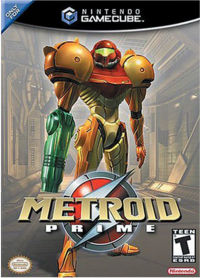Metroid Prime

| |
| Metroid Prime | |
| Full Title | Metroid Prime |
| Developer | Retro Studios |
| Publisher | Nintendo |
| System | Gamecube, Wii |
| Release Date | GCN US November 15, 2002 JP February 28, 2003 EU March 21, 2003 Wii JP February 19, 2009 |
| Genre | Action/First Person Shooter |
| Gallery | GH Gallery |
| Rating | ESRB: Teen |
Metroid Prime was the first 3D Metroid game and the first game in the series in eight years. Though some fans were worried about reviving the dormant franchise in the form of a first person shooter, the game was ultimately successful.
Story
The story is set between Metroid and Metroid II: The Return of Samus. Samus received a distress signal and followed it. It brought her to a space pirate frigate full of biological experiments orbiting Tallon IV. After killing the Parasite Queen, the ship began to self destruct. While escaping, Samus ran into Meta Ridley and lost most of suit while escaping.
Samus follows Meta Ridley to the surface of Tallon IV. There she finds the remains of an ancient Chozo colony and a mysterious substance called Phazon.
Gameplay
The game is similar to previous games in the series in the fact that the player is in an open-ended world. The game is divided into six different areas connected by elevators. As the player uncovers new abilities, they are able to reach new areas.
The first person style gameplay lends itself to several innovations. The player is able to lock-on to targets, similar to the Z-Lock system introduced in The Legend of Zelda: Ocarina of Time. Players can also use different visors to see differently. For example, the infrared visor is helpful when battling enemies that blend into their surroundings. There is also the scan visor, which can be used to identify enemies and log entries that are saved to Samus's Logbook.
If the player has a Game Boy Advance and a copy of Metroid Fusion, players can connect the two games. Connecting them can unlock the original Metroid as well as the Fusion suit if the player has beaten one of the games.
Continuity Notes
- The game chronologically acts as a follow-up to the original Metroid. The entire Prime subseries is set between the original two Metroid games. This game references the events Metroid, particularly from the Space Pirates' point of view through their logs. The game also shows how Ridley survived following Metroid.
- This game also notably follows the fate of the Chozo, which was not addressed in the other games. Their lure entries allude to their time raising Samus, which would be the first time this was directly mentioned within the games. However some continuity references such as this were changed in the PAL version.
Legacy
Metroid Prime spawned its own subseries which had several spin-offs and sequels which are mentioned below. This subseries seemed to end in 2007 with the end of the main Prime trilogy, as Nintendo then reclaimed control of the franchise while Retro went on to work on other Nintendo properties.
Sequels
Metroid Prime has had two sequels: Metroid Prime 2: Echoes and later the third and final Metroid Prime game, Metroid Prime 3: Corruption, for the Nintendo Wii. It has also led to two spin-offs, Metroid Prime Hunters and Metroid Prime Pinball.
Rereleases
- A special version of Metroid Prime was bundled with the platinum Gamecube to promote Metroid Prime 2. It included a second disc with a Metroid timeline, an art gallery, and a trailer and demo for Metroid Prime 2.
- In Japan, the game was rereleased with new Wii controls as part of the New Play Control series. However in North American and Europe, Metroid Prime was be rereleased with its sequels on the Nintendo Wii as Metroid Prime Trilogy.
| Titles in the Metroid Series |
|---|
| Metroid (Zero Mission) - Return of Samus (3DS) - Super Metroid - Other M - Fusion Metroid Prime - Pinball - Echoes - Hunters - Corruption - Federation Force - 4 Metroid Dread |